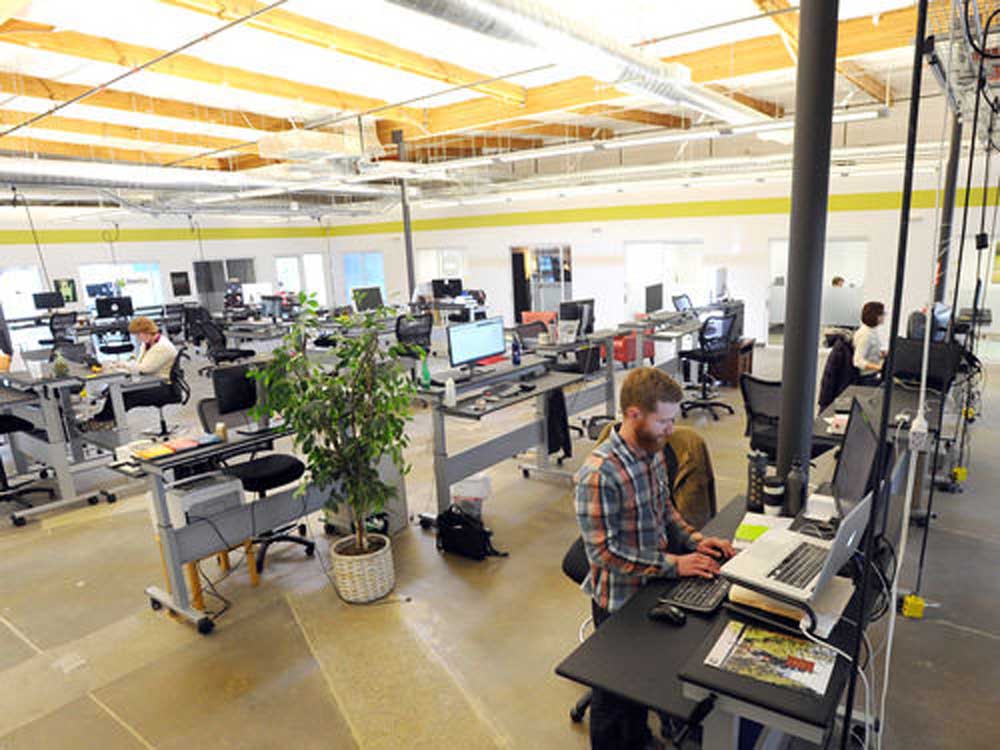Bend-Redmond area has numerous home-based workers
Published 12:00 am Friday, April 6, 2018

- Many of the people who use the BendTECH co-working office telecommute, which is more common in Bend than most U.S. cities. (Ryan Brennecke/The Bulletin file photo)
Ryan Everist has been working remotely for four years, but now that he lives in Bend, he’s more likely to bump into other people who log in every day from a home office.
The Bend-Redmond metro area has one of the highest concentrations of home-based workers in the United States, according to a one-year estimate from the U.S. Census Bureau’s American Community Survey. Nine percent of the metro area’s workforce reported spending the majority of the week at home in 2016, putting Bend behind only Lawton, Oklahoma, and Boulder, Colorado, according to the Census data.
In the previous year’s survey, the Bend-Redmond area, which encompasses Deschutes County, led the nation with 12.9 percent working from home.
The change from 2015 to 2016 is not statistically significant because the margin of error in the one-year estimate is large, Census statistician Peter Mateyka said.
Regardless of where Bend’s telecommuting workforce ranks, it’s drawing attention from local tech employers. The Technology Association of Oregon wants to know more about these skilled professionals — what companies they work for, how often they’re flying, their connections to the community and any challenges they might be facing, said Teri Hockett, head of the association in Central Oregon.
Hockett hopes anyone who works from home will attend a tech meetup from 5 to 7 p.m., May 7 at the BendTECH Coworking center at 1001 SW Emkay Drive.
Everist, 31, moved here in October after his wife landed a job with a Central Oregon physical therapy practice. He works in business development for a Tennessee-based health care analytics firm.
“Definitely, flight planning is a little different, but nothing major,” he said. “Most of the people I work with are on the West Coast, so I can still get to San Francisco or Seattle or Denver.
“Overall, it’s just great that my wife and I can wake up in the morning, go for a walk on the river trail, then be back at my desk and work.”
Everist said he’s met one other telecommuter, who works for Amazon Web Services, and he’s starting to look for ways to connect to the community through volunteering and networking. A new Meetup.com group, Young Work from Home Professionals of Bend, might help with that.
Remote workers are good for Bend’s economy because they’re bringing new sources of income to the community, said Damon Runberg, Central Oregon economist with the Oregon Employment Department. The Census survey captures much more than tech workers, he said. Anyone who works mostly from home is counted, so that can include small-business owners and consultants, which are very common in Bend, he said.
Runberg said two of his friends who work from home are in financial services.
Other top work-from-home cities are like Bend in that they tend to be small metro areas, Runberg said. Boulder was second with 12 percent of its workforce at home, and Santa Fe, New Mexico, was fourth. Austin, Texas; Walla Walla, Washington; Medford, and Asheville, North Carolina, are also in the top 10. “All those places have relatively high quality of life,” he said.
Lawton, Oklahoma, near Fort Sill, had the highest concentration of home-based workers in 2016 — 13 percent. Two other cities near military bases, Columbus, Georgia, and Pensacola, Florida, were also in the top 10. Those cities tend to rank high because people who live on a military base tend to answer the survey by saying they work at home, Mateyka said.
—Reporter: 541-617-7860, kmclaughlin@bendbulletin.com






